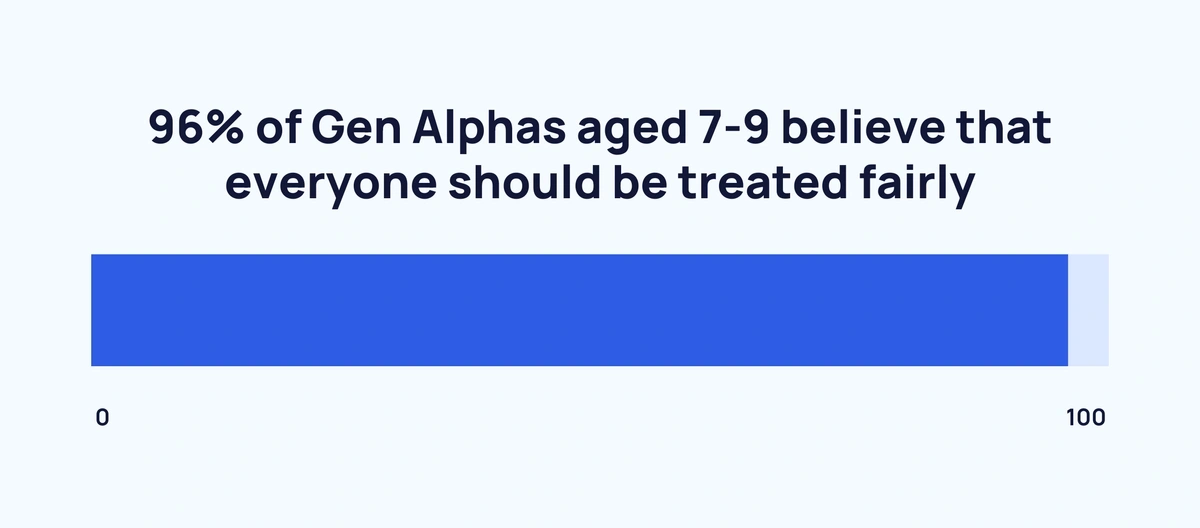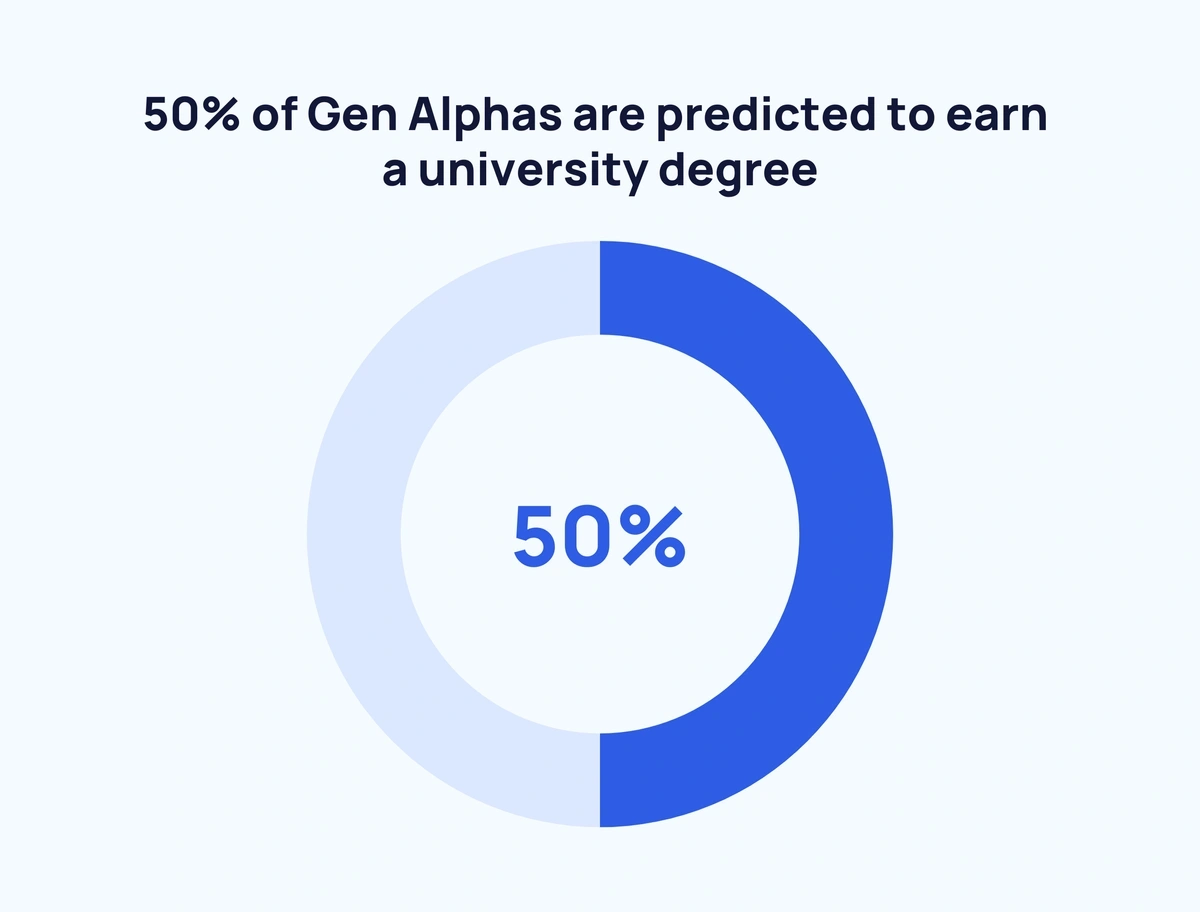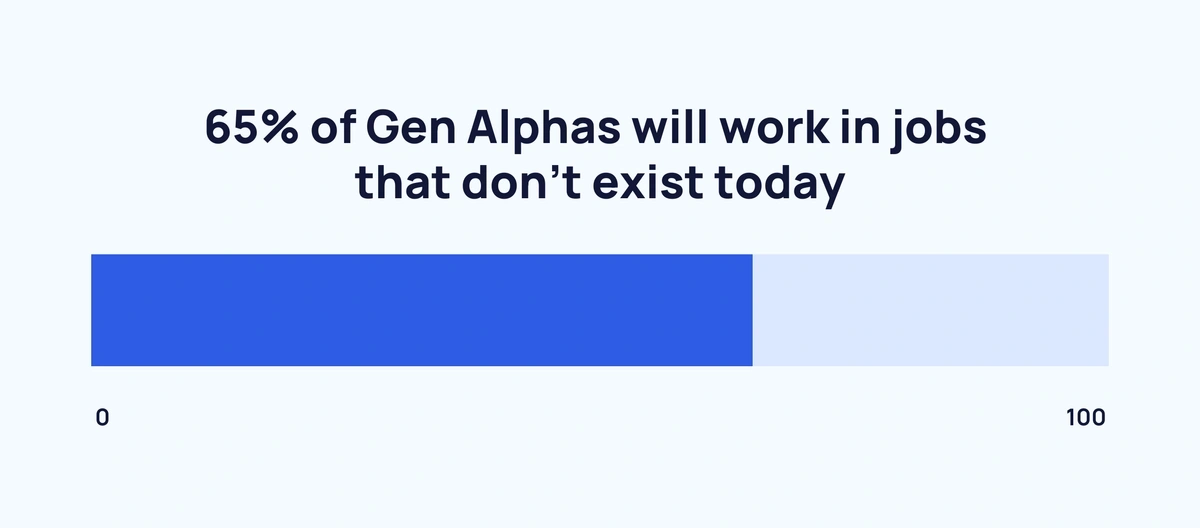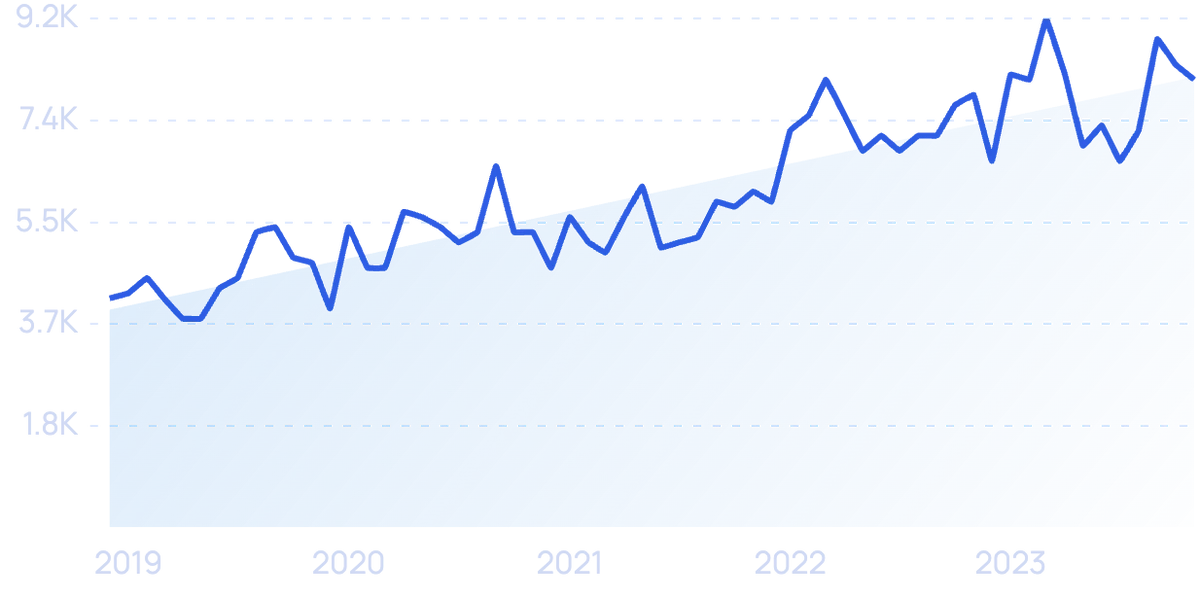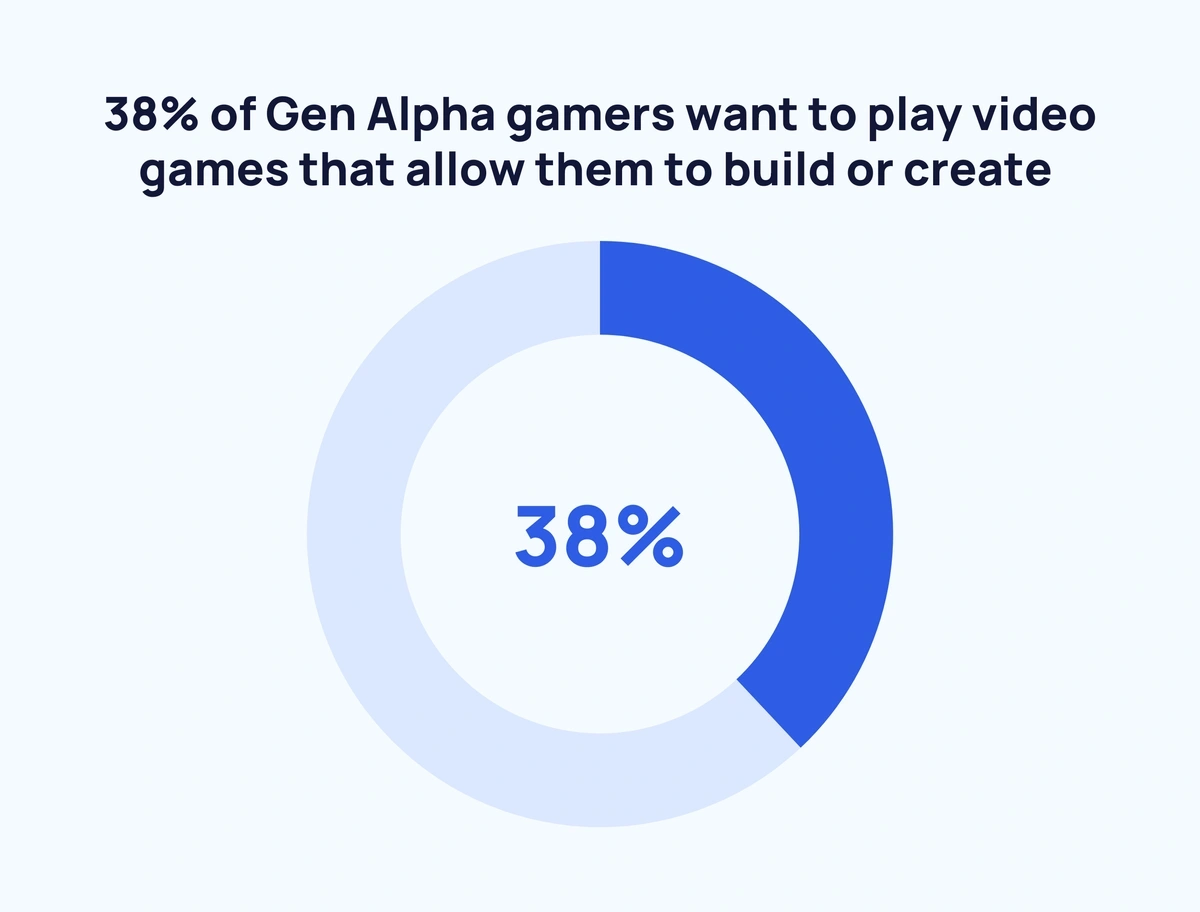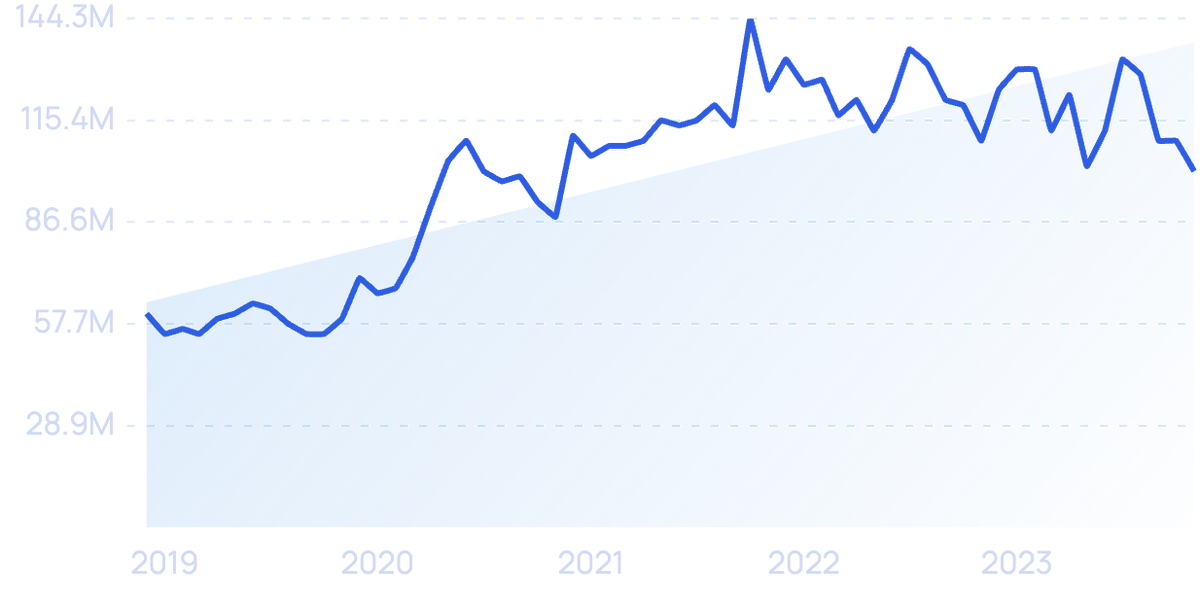
Generation Alpha: Statistics, Data and Trends (2024)
Generation Alpha is made up of people born — or yet to be born — between 2010 and 2025. They’re the first generation born entirely in the 21st century. Broadly speaking, their parents are Millennials and their older siblings are Gen Zs.
Gen Alpha is in a unique position. While they’re not the first digitally-native generation (that would be Gen Z), they understand and adapt to new technology faster than any previous generation.
Millions of Gen Alphas are yet to be born, and the oldest aren’t even in high school yet. As such, their future outlook is mostly up in the air. But by examining their attitudes and perspectives today, we can get a clearer picture of what the future might hold for them.
Ready to learn about Generation Alpha?
Contents
- Top Generation Alpha Statistics
- Overall Generation Alpha Statistics
- Generation Alpha Education & Career Statistics
- Generation Alpha Consumer Statistics
- Generation Alpha Entertainment Statistics
Top Generation Alpha Statistics
Looking for a quick overview? Here are the top 5 Gen Alpha stats.
- 2.8 million Gen Alphas are born globally each week.
- 65% of Gen Alphas will work in jobs that don’t exist today.
- Generation Alpha is the most diverse generation in US history.
- Half of Gen Alphas are expected to earn a university degree.
- 66% of Gen Alphas prefer to buy from companies that make a positive difference in the world.
Overall Generation Alpha Statistics
Generation Alpha is the first generation born in the 21st century. Raised with more diversity and technology than any previous generation, Gen Alphas see and interact with the world differently than their parents and older siblings. These stats cover who Gen Alphas are, the issues they face, and what matters most to them.
Almost 3 million Gen Alphas are born globally each week (McCrindle)
By 2025, there will be more than 2 billion Gen Alphas living in the world. India, China, and Indonesia are the top 3 countries for Gen Alpha births. Based on these projections, Generation Alpha will be the largest generation in history.
Generation Alpha is the most diverse generation in US history (Hotwire Global)
Racial demographics in the United States have been tilting toward more diversity over the past several decades, and Gen Alpha reflects that shift. According to the latest US census, 47% of American children identify as non-white.
Around 19 in 20 Gen Alphas aged 7-9 believe that everyone should be treated fairly no matter what they look like (Canvas8)
93% believe it’s important to be “accepted for who you are.” Additionally, 97% believe that everyone should have enough food to eat and 96% believe that everyone should have a place to live.
Gen Alphas will live longer than previous generations (World Bank)
Increased life expectancy has been a trend throughout human history, and there are already half a million centenarians alive today. The average human born in 1980 can expect to live for 63 years. Gen Alphas born in 2020 have a global average life expectancy of 73 years — 16% longer than their Millennial parents.
Generation Alpha considers family the most important thing in life (Wunderman Thompson)
When Wunderman Thompson asked 4,000 Gen Alphas what was most important in life, 71% said family. Friends (43%), happiness (31%), health (19%), and education (17%) rounded out the top 5 answers. TV (6%), social media (5%), and fame (2%) were all at the bottom of the list.
Generation Alpha Education & Career Statistics
Generation Alpha is growing up at an unprecedented time for both education and work. Remote learning and education technology give students more ways to learn. As Gen Alpha enters the workforce, they’ll have exciting career paths that don’t even exist today.
Half of Gen Alphas are predicted to earn a university degree (McCrindle)
Generation Alpha is set up to be the most highly-educated generation in history. Mark McCrindle predicts that 90% will earn a high school diploma (compared to 80% of Gen Z teenagers) and half will complete their secondary education.
84% of American students use technology in the classroom (Qustodio)
Most of the oldest American Gen Alphas spent at least one full school year remote learning during the COVID-19 pandemic. Since then, technology has become ubiquitous in education.
60% of American students have a school-provided device, and an additional 14% bring their own devices from home.
65% of fourth-graders aren’t proficient in reading (AECF)
Reading is an important metric in predicting education outcomes. By the fourth grade, children are expected to learn other subjects by reading about them. With almost two-thirds of fourth graders underperforming in reading, literacy remains a top priority for today’s educators.
Around 2 in 3 Gen Alphas will work in jobs that don’t exist today (McCrindle)
With technology accelerating at a rapid pace, entirely new industries will exist by the time Gen Alpha enters the labor market. They’ll also hold jobs in today’s emerging industries, like artificial intelligence and blockchain technology.
67% of 6-9-year olds say they want to have a career that helps them save the planet (Wunderman Thompson)
When it comes to career outlook, “making a difference” is a common denominator among Gen Alphas. 59% say they want a career that involves saving lives. 51% want a career that allows them to use technology to make a difference.
STEM career opportunities could increase by 11% over the next decade (BLS)
By 2031, the oldest Gen Alphas will start entering the workforce. STEM — science, technology, engineering, and math — jobs are projected to grow at twice the rate as all jobs combined between now and then. The average STEM job commands a $95,000 median annual salary, compared to $45,000 for all jobs combined.
Generation Alpha Consumer Statistics
It might seem like a stretch to think of Gen Alpha as consumers since the oldest among them are still in primary school. But Alphas have money to spend, and plenty of brand awareness to influence the spending habits of their Millennial parents.
66% of Gen Alphas prefer to buy from companies that make a positive difference in the world (Wunderman Thompson)
82% of Gen Alphas say they’re looking forward to having their own money so they can make their own purchases. Conscientious and sustainable companies are more likely to court Gen Alpha as buyers. 18% of Gen Alphas say they’d prefer to buy products made with sustainable materials.
Google searches for “environmental, social, and corporate governance” over the past 5 years.
25% of Gen Alphas use influencers as their main source of shopping inspiration (Wunderman Thompson)
While slightly more Gen Alphas get product inspiration from their friends (28%), influencers have a tremendous impact on Gen Alpha shopping behaviour. 55% of Gen Alphas want to buy products if they see their favorite YouTube or Instagram personalities using them.
Google searches for “fashion influencer” are up 96% over the past 5 years.
Gen Alpha’s brand preferences are more likely to align with Millennials than Gen Z (NCSU)
Gen Alphas are often referred to as “mini Millennials” for a reason: their parents are mostly Millennials. Millennial parents’ shopping behaviors are likely to get passed on to their Gen Alpha kids. Children can start recognizing — and even preferring brands — as young as 3 years old.
The number of Gen Alphas with bank account access has jumped 7% over the past year (GWI)
According to GWI, almost a third of global teens have access to a bank account. Companies like Greenlight offer debit cards specifically for kids and teens. In 2021 alone, kids had a collective $225 million in Greenlight savings accounts.
Generation Alpha Entertainment Statistics
What sort of media does Generation Alpha consume? How do they balance time spent outdoors, with friends, and in front of screens? Here are the latest Gen Alpha entertainment stats.
Gen Alpha spends more time looking at screens than any other generation (McCrindle)
Gen Alphas have access to smartphones and tablets from an increasingly early age. Children between 8 and 12 years old spend an average of 4 hours and 44 minutes in front of screens every day.
47% of Gen Alphas say they prefer to split their free time between screen time and being outdoors (Wunderman Thompson)
Smartphone addiction and social media addiction have been on the rise in recent years. Generation Alpha may represent the pendulum swinging in the opposite direction. In fact, more would rather spend time outside (27%) than indoors (26%). 46% of Gen Alphas say they wish to pursue a career that lets them work outdoors.
Gen Alphas use an average of 4.2 streaming services (GWI)
59% of Gen Alphas say that watching TV and movies is their favorite weekend activity, and 50% name it as their favorite after-school activity. 70% of 8 to 11-year-olds consider TV and movies to be among their favorite activities.
Singing and dancing are Gen Alpha’s favorite TV show genres (GWI)
34% of Gen Alphas say they like watching TV shows they can dance to, while 33% say the same about singing shows. 30% enjoy watching shows about sports and 26% like watching cooking shows. Siblings also help influence Gen Alpha’s watching habits, with 27% saying they’ll watch what their siblings are watching.
Around 2 in 5 Gen Alpha gamers want to play video games that allow them to build or create (GWI)
Games designed to facilitate creativity are the top choice for Gen Alpha gamers. 58% report playing Minecraft over the past month, and 43% report the same for Roblox.
Google searches for “Roblox” over the past 5 years.
Wrap Up
Generation Alpha is the youngest generation living on the planet today. By the time they’re all born in 2025, they’ll be the largest demographic. Alphas are tech-savvy with a deep sense of environmental and social awareness.
As Gen Alpha matures, their expectations from brands, organizations, and governments are sure to have a lasting impact on the next several decades of human history.
For more related content, take a look at Key Gen Z Trends and Millennial Trends.


